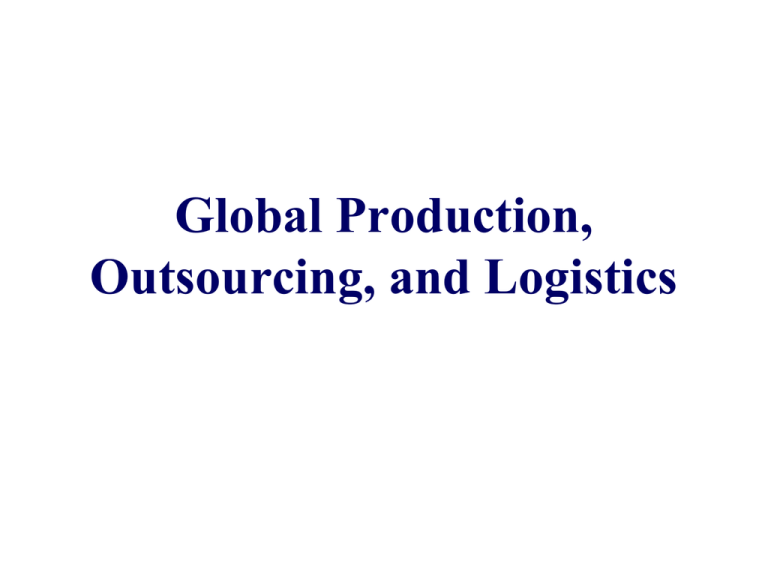
Global Production,
Outsourcing, and Logistics
16 - 2
Introduction
• In a globalized world, managing supply chains is
shockingly difficult
- How should a globally dispersed supply chain be
managed?
- To what extent should we own our factories rather than
outsourcing?
- Should the firm manage global logistics itself, or should it
outsource the management?
- Where should production be done?
- What strategic role should foreign production sites play?
McGraw-Hill/Irwin
International Business, 6/e, 7/e
Portions © 2007, 2009 The McGraw-Hill Companies, Inc.,
All Rights Reserved.
16 - 3
Strategy, Production,
and Logistics
• Production is the activities involved in creating a
product
- especially direct physical work
- but includes both service and manufacturing activities
• Logistics is the activity that controls the transmission
of physical materials through the value chain
• Production and logistics are closely linked since a
firm’s ability to produce depends on timely,
high quality inputs
McGraw-Hill/Irwin
International Business, 6/e, 7/e
Portions © 2007, 2009 The McGraw-Hill Companies, Inc.,
All Rights Reserved.
16 - 4
Strategy, Production,
and Logistics
• Technology and location economies are reducing the
direct cost of production
• So supply chain management, logistics and other
service work have become more important
McGraw-Hill/Irwin
International Business, 6/e, 7/e
Portions © 2007, 2009 The McGraw-Hill Companies, Inc.,
All Rights Reserved.
16 - 5
The demands on supply chains
are amazingly complex
• In addition to low cost and high quality and reliability,
two other objectives have particular importance
- Production and logistic functions must accommodate
demands for responsiveness
- Production and logistics must be able to respond quickly to
shifts in customer demand
McGraw-Hill/Irwin
International Business, 6/e, 7/e
Portions © 2007, 2009 The McGraw-Hill Companies, Inc.,
All Rights Reserved.
16 - 6
Make or Buy Decisions
• Should a firm make or buy component parts?
• Advantages of making:
-
Can become most efficient producer (control your destiny)
Can make own specialized long-term investments
Protect proprietary product technology
Improved scheduling
• But – the more people you employ and the more
facilities you operate, the more likely you will
become bureaucratic
- You wind up doing things you’re not very good at
McGraw-Hill/Irwin
International Business, 6/e, 7/e
Portions © 2007, 2009 The McGraw-Hill Companies, Inc.,
All Rights Reserved.
16 - 7
• Advantages of buying components
- Flexibility in sourcing – can switch suppliers
- Can cut cost structure quickly
- Long-term alliances with suppliers give benefits of vertical
integration with less of the associated problems
McGraw-Hill/Irwin
International Business, 6/e, 7/e
Portions © 2007, 2009 The McGraw-Hill Companies, Inc.,
All Rights Reserved.
16 - 8
• The key challenge: Understand and manage the total cost of
sourcing, including:
- inventory costs
- costs of inspections and defects
- effect of a supplier’s work on the final performance of the
product
- all transportation costs
- importing costs including
• tariffs
• difficulties of working with customs
- time required to process orders
- supplier ability to work with your technological system (Drake, pp. 44-45)
McGraw-Hill/Irwin
International Business, 6/e, 7/e
Portions © 2007, 2009 The McGraw-Hill Companies, Inc.,
All Rights Reserved.
16 - 9
Strategic Role of
Foreign Factories
• Often initially established where labor costs low
• Later, important centers for design and final assembly
• Upward migration caused by improvement in local
capabilities and by pressures to:
- Improve cost structure
- Customize product to meet customer demand
- An increasing abundance of advanced factors of
production
McGraw-Hill/Irwin
International Business, 6/e, 7/e
Portions © 2007, 2009 The McGraw-Hill Companies, Inc.,
All Rights Reserved.
16 - 10
Role of Information Technology
and the Internet
• Firms today use electronic data interchange (EDI) to
coordinate the flow of materials into manufacturing,
through manufacturing, and out to customers
• EDI systems require computer links between a firm, its
suppliers, and its shippers; these electronic links are then
used
- To place orders with suppliers
- To register parts leaving a supplier
- To track them as they travel toward a manufacturing
plant
- To register their arrival
McGraw-Hill/Irwin
International Business, 6/e, 7/e
Portions © 2007, 2009 The McGraw-Hill Companies, Inc.,
All Rights Reserved.
16 - 11
McGraw-Hill/Irwin
International Business, 6/e, 7/e
Portions © 2007, 2009 The McGraw-Hill Companies, Inc.,
All Rights Reserved.
16 - 12
A Production, Outsourcing,
and Logistics Case
• When introducing the X-Box
gaming console, Microsoft had to
decide if it should manufacture
the console or outsource
manufacturing
- Microsoft primarily creates software
and lacked the manufacturing
capabilities to make the X-Box
McGraw-Hill/Irwin
International Business, 6/e, 7/e
Portions © 2007, 2009 The McGraw-Hill Companies, Inc.,
All Rights Reserved.
16 - 13
• Microsoft decided to outsource production to
Flextronics for four reasons
- Flextronics’ industrial park strategy would allow good
control of the supply chain
• Flextronics takes care of the subcontractors
- Flextronics had a global presence
- Flextronics’ Web-based information systems would
share information well with Microsoft
- Microsoft trusted Flextronics
McGraw-Hill/Irwin
International Business, 6/e, 7/e
Portions © 2007, 2009 The McGraw-Hill Companies, Inc.,
All Rights Reserved.





